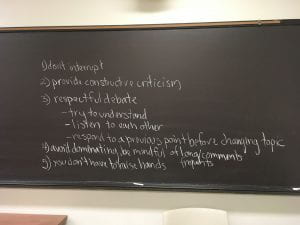 Practically everyone at the university has had a moment like this in the past month: “oh, we’ve been doing this for a year now.” This is our fourth (and perhaps last!) online quarter, and our second online Spring Quarter. We might feel like we’re running out of gas, while also realizing that we’re more equipped than ever to support ourselves and each other, armed with resources that have become second nature. What might it look like to finish the year strong, aiming for productivity and impassioned learning while also encouraging healthy self-care habits in ourselves and our students? We reached out to Ada Palmer, Associate Professor of Early Modern European History and author of Healthy Academic Work Habits and the Crisis Syllabus Design Guide, to discuss.
Practically everyone at the university has had a moment like this in the past month: “oh, we’ve been doing this for a year now.” This is our fourth (and perhaps last!) online quarter, and our second online Spring Quarter. We might feel like we’re running out of gas, while also realizing that we’re more equipped than ever to support ourselves and each other, armed with resources that have become second nature. What might it look like to finish the year strong, aiming for productivity and impassioned learning while also encouraging healthy self-care habits in ourselves and our students? We reached out to Ada Palmer, Associate Professor of Early Modern European History and author of Healthy Academic Work Habits and the Crisis Syllabus Design Guide, to discuss.
While working on these two pieces, which give instructors advice on adapting both their class and personal time to digital teaching, Palmer noticed that there are periods in the academic year that show spikes in mental health visits. Interestingly, these spikes are distinct to different universities, and they’re not always aligned with exam weeks. She concluded that there are small elements of the design and rhythm of a school year that can affect when we hit a breaking point. One period of tension that is unique to UChicago is the first two or three weeks of spring quarter, due to the short rest that students have between finals and beginning a new course load. This is always the case, but Palmer predicted it may be exacerbated by the remote format.
However, she also believes that spring quarter as a whole might be easier in other ways, since most everyone teaching in the spring has already taught online. Students in particular have learned coping skills for their adapted courses, and are developing proficiency at peer mentoring each other. “One thing that helps a lot at a point of tension is to realize that it’s a point of tension, and realizing that feeling stressed out and not okay is, in fact, both appropriate and normal. If we all know that we’re entering a crunch point and we have to support each other, I think we’ll be okay.”
Course Design
Palmer’s Syllabus Design Guide focused on pedagogy, and how it can “lessen stress in remote learning during a global tragedy.” She found that there were a lot of materials being published on the technical aspect of teaching virtually, and not as many that focused on structuring your course to relieve some of the stress placed on instructors and students.
The most important addition that Palmer recommends making to a remote syllabus is building in pre-designed substitutes and alternatives for missed assignments. Some of Palmer’s syllabi in the past were designed in such a way that made it difficult for students to catch up if they missed an assignment, a class, or even a whole week. Palmer recognizes that the pandemic has now created a mental health crisis, and that the very students who might need flexibility or are dealing with an emergency are those who don’t have the time or energy to communicate extensively with their instructors about accommodations. To lower this barrier, Palmer’s syllabi now include options like alternative final paper prompts, or a certain number of assignments that can be dropped or taken as extra credit. Now neither she nor her students need to improvise if a student misses something.
In particular, Palmer is skeptical about extensions as the normative response to missed work. They create a situation where a student has to do double the amount of work the next week, while they might still be dealing with the after-effects of a mental health crisis or family emergency. Deadlines bunch up quickly for students who take extensions. Instead, Palmer suggests looking at the particular assignment that was missed and determining what the function was. Is there a way to keep the workload consistent while still giving the student the opportunity to practice the skill or demonstrate the competency that the assignment focused on? This is why creating indispensable assignments that can’t be moved or adapted makes things difficult, but it’s always possible to try to find another tradeoff that can be made in terms of the work that the student has due. Now, when a student asks for an extension, Palmer considers both that assignment and the work for the following week, to lessen the student’s workload slightly in both cases.
More broadly, Palmer believes that the courses that give students and instructors the most difficulty are the ones that tried to adapt to the online format by replicating a face-to-face classroom as closely as possible. In keeping with principles of reverse course design, Palmer says that instructors are best served by asking what their courses were achieving, and how those same goals can be attained through different means in the online environment. “Inflexibility of thought makes digital implementation rougher,” she says. “The same training isn’t what’s necessary. The right training is what’s necessary.”
Normalizing Self-Care
Palmer often uses metaphors of physical injury to talk about mental illness, and finds it striking how well that resonates with people. Equating stress and exhaustion with less stigmatized health concerns helps people understand, so Palmer has started making this a frequent point of comparison when introducing the topics. “Just as its normal for a tennis player to understand and know how to cope with tennis elbow,” she says, “scholars should understand burnout and depression.”
Since it’s important for students to understand these concepts, so they know how to recognize symptoms and offer support to themselves and others, Palmer makes a point of talking to her students about self-care. At the beginning of a course, she gives students a copy of the Healthy Academic Work Habits handout, and throughout the quarter she brings up the ways in which she is being mindful of her own mental health. “I try to say it directly, so they see it. I try to be an example – mention it when it comes up naturally, make it feel normal. I think that that makes a huge difference because instructors are role models, and the way our society presents role models is always silent about the small self-care things. Profiles on successful people leave out if they need exercise or physical therapy. They leave out what they do for their leisure activities that isn’t intellectual and focused. It also leaves out when they get stressed out, and the omission of that is a big part of where imposter syndrome comes from.”
As an author, Palmer knows from personal experience how important self-care is to productivity. When asked about how she self-motivates to get such significant amounts of writing done, she said:
“I have to be rested enough. Even though it’s my favorite activity, writing time can be very rare, because it really requires my brain at 100%, and there might be weeks or months when it never gets there. The struggle of fitting in writing time is actually the struggle of fitting in the self-care activities that get me into a good enough state to be able to write. It’s ferociously carving out time for exercise. It’s ferociously carving out time for breaks during the day. All of which are easy to back-burner, because it’s always easy to say, ‘a corner needs to be cut.’ Self-care is always the easiest corner to cut, but it’s usually the wrong corner, because you’ll usually actually produce less. And so, the hard work of fitting in writing time is actually the hard work of sitting in front of the computer, looking at a giant to-do list, and saying ‘no, I am not allowed to do any of these tasks. I have to go do my physical therapy.’ And it feels like the wrong choice, and sometimes it means missing a deadline. And you realize you probably could meet that deadline. Sometimes it is the right choice to burn tomorrow to get the extra few hours today. But it’s easy to do that without thinking too hard about it, to just choose that over and over. And I try hard to always remind myself that while this feels like the most productive choice, it’s actually the less productive choice. And one thing about being a writer as well as being a student as well as being a scholar, it’s very easy to say, ‘oh, a deadline means I should make an exception.’ But you’ll always have a deadline.”
Ada Palmer is a cultural and intellectual historian focusing on radical thought and the recovery of the classics in the Renaissance. She works on the history of science, religion, heresy, freethought, atheism, censorship, books, printing, and on patronage and the networks of power and money that enabled cultural creation in pre-modern Europe. She is also a science fiction and fantasy novelist, best known for her award-winning Too Like the Lightning (Tor Books: 2016).


